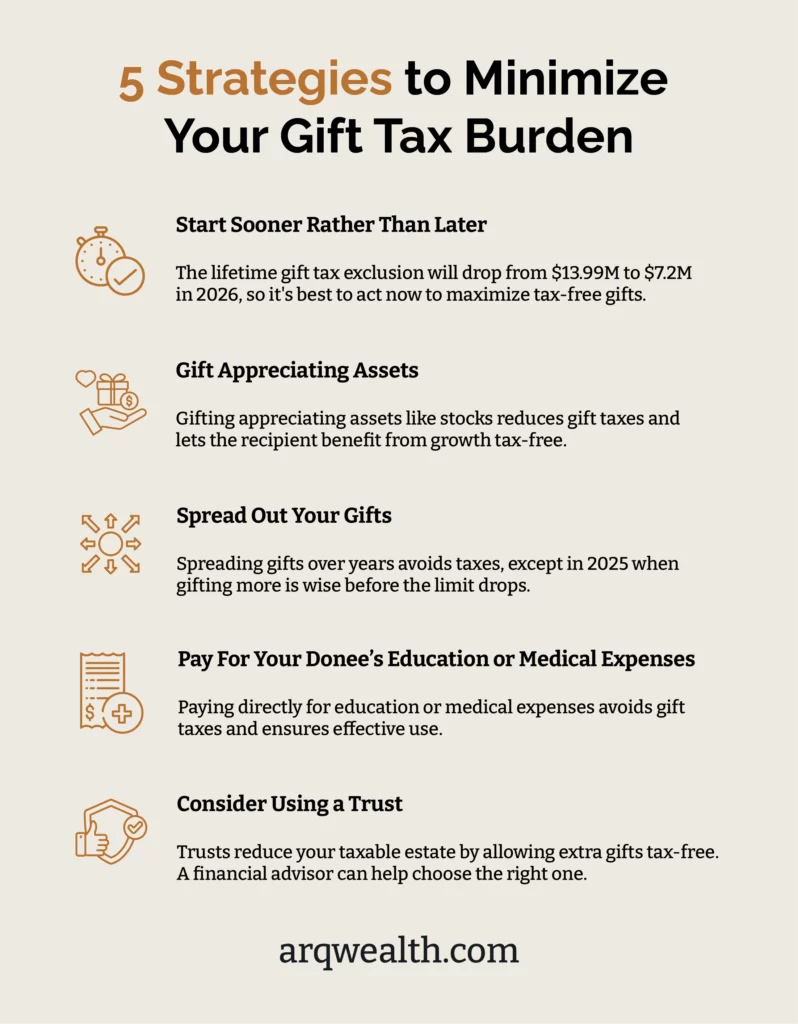Being generous with your wealth in your golden years is beneficial in a number of ways. However, if you plan on donating gifts to your family or friends, you may be responsible for paying a gift tax, which could have unintended consequences on your retirement plan. This article will discuss what gift tax is, how to avoid gift tax, and some of our favorite tax reduction strategies.
For customized advice about how you can avoid gift tax when sharing wealth, please be sure to contact the ARQ Wealth team by calling (480) 214-9572. ARQ Wealth’s financial advisors can position you to reach your financial goals while minimizing your tax burden.

What is a Gift Tax?
A gift tax is a tax on the transfer of property by one individual to another while receiving nothing in return. The IRS states that if you send any of the following items to someone without expecting anything in return, then you may be making a taxable gift to that person:
- Money
- Income from a property
- An interest-free loan
- An item at a reduced value
It’s worth reiterating that gift taxes aren’t solely reserved for a chunk of money you send someone. It could also apply to an interest-free loan you send to a sibling, close friend, or family member. Since this type of friendly giving can be common, you should be wary of the unexpected tax implications that it can have. You’ll have to pay a gift tax even if you don’t necessarily intend the transfer to be a gift.
However, if you intend to send an actual gift, then you do not have to worry about your gift increasing the recipient’s federal income tax. Since the donor pays the tax, the donee does not have to pay again. This means your friend won’t get an unexpectedly large tax bill if you send them $50,000 (as long as you pay the tax on your end).
There are also legal thresholds in place that determine when you have to pay a gift tax and how much you’ll pay. These thresholds are known as the annual gift tax exclusion and the lifetime gift tax exclusion.
2025 Annual and Lifetime Gift Tax Exclusions
The annual gift tax exclusion is the total monetary amount that you can send to another person per year without paying taxes. In 2025, the annual gift tax exclusion is $19,000 for individuals and $38,000 for married couples. This means that you don’t need to worry about reporting the birthday money that you send to your family unless you’re sending them over $19,000 throughout the year.
Every person that you send gifts to has their own annual gift tax limit. For example, an individual with four children could legally gift $19,000 to each child annually (for a total of $76,000) without paying taxes. For married couples, the annual gift tax exclusion doubles. A married couple with four children could legally gift each of them $38,000 annually ($152,000 total). While children are the common recipients of gifts, you can technically send a gift to anyone, including your spouse, close friends, or coworkers.
If you send enough gifts throughout your life, you’ll also need to be aware of the lifetime gift tax exclusion.
The lifetime gift tax exclusion is the cumulative total for how much you can gift tax-free over the course of your life. In 2025, the lifetime gift tax exclusion is $13.99 million for individuals and $27.98 million for married couples (up from $13.61 million and $27.22 million in 2024). Every time you send a gift, it goes against your lifetime gift tax exclusion. But, you won’t have to worry about paying taxes until you’ve exceeded $13.99 million (or $27.98 million) in total lifetime gifting.
What Happens After I Reach the Exclusion Amount?
Gift tax rates range between 18% and 40% depending on how much you’ve exceeded the lifetime gift tax exclusion threshold ($13.99 million in 2025). However, there are other ways to potentially avoid paying this gift tax, which is why it’s beneficial to speak with a financial planner who can identify areas to reduce your estate tax bill.
For example, not all monetary transfers count as gifts, which you can use to your advantage.
What Classifies as a Gift?
The IRS technically states that any gift can be a taxable gift. Don’t worry though, this rule has plenty of exceptions. For example, the following gifts do not qualify as taxable gifts:
- Tuition expenses
- Medical expenses
- Gifts to your spouse
- Gifts to a political organization for its use
You can send any of these gifts without worrying about the tax implications. There are a handful of other scenarios that might qualify which, again, is why it’s critical to speak with a financial advisor.
At ARQ Wealth Advisors, we normally view gifting as a crucial pillar of estate planning because it allows you to give away chunks of your estate easily and completely tax-free (as long as you’re under the thresholds). Even if you’re above these thresholds, there are still steps you can take to minimize your gift tax burden.
5 Strategies to Minimize Your Gift Tax Burden
There are five key ways that you can minimize your gift tax burden throughout your life.

Start Sooner Rather Than Later
The lifetime threshold for the amount that you can gift is currently significantly elevated. In fact, the lifetime gift tax exclusion is almost double its normal amount. But, this immense opportunity will end after January 1, 2026, unless Congress intervenes.
The current $13.99 million individual lifetime gift tax exclusion will drop to roughly $7.2 million starting in 2026. This will drastically reduce the amount that you can gift tax-free to friends, family, or charitable organizations. With this in mind, it’s in your best interest to start making gifts as soon as possible. Doing so could allow you to gift away significantly more money tax-free than if you wait.
Gift Appreciating Assets
Another way to reduce your gift tax burden is to give appreciating assets (like a portfolio of stocks or bonds) instead of cash. When you gift assets to someone, you do not have to pay gift taxes, assuming you are gifting them at a fair market value.
For example, you can give a portfolio of stocks worth $50,000 to your sibling without paying any taxes. Although, you’ll still have to file a gift tax return with the IRS because this technically crosses over the threshold limit. This means that, if you have a large sum of cash sitting in an account, then it might make sense to invest the money first before gifting it to avoid a potential gift tax.
This strategy is also advantageous because your recipient will receive an appreciating asset that will grow in value over time, as opposed to cash, which decreases in value over time due to inflation. This is especially helpful if you’re sending a gift to a younger family member who might have little use for cash but would greatly benefit from the compounding power of a stock portfolio.
Spread Out Your Gifts
Another easy way to avoid paying gift tax is to spread your gifts over years instead of sending large lump sums.
Please note that this excludes 2025, when it makes sense to gift as much as possible before the threshold decreases. If Congress opts to extend the elevated lifetime exclusion, you may benefit from spreading your gifts over the years.
This strategy is valuable as long as your recipient doesn’t need the money anytime soon, as it can help you stay under the $19,000/$38,000 annual gift tax threshold.
For example, let’s say that you and your spouse have $250,000 in a savings account and want to begin transferring it to your only child. If you send all $250,000 at once, then you’d have to pay a significant sum in taxes because you’re well over the annual exclusion amount. Instead, consider breaking up this payment over 7 years to save money on taxes. Here’s what that would look like:
- Year 1: Transfer $38,000 ($212,000 remaining balance)
- Year 2: Transfer $38,000 ($174,000 remaining balance)
- Year 3: Transfer $38,000 ($136,000 remaining balance)
- Year 4: Transfer $38,000 ($98,000 remaining balance)
- Year 5: Transfer $38,000 ($60,000 remaining balance)
- Year 6: Transfer $38,000 ($22,000 remaining balance)
- Year 7: Transfer $22,000 ($0 remaining balance)
Spreading out payments this way helps you avoid a large annual gift tax. It can also be beneficial for your recipient as they might prefer to receive smaller annual installments instead of a large lump sum payment.
Pay For Your Donee’s Education or Medical Expenses
You can also reduce your gift tax bill by sending financial gifts not subject to gift tax like educational and medical expenses.
For example, let’s say you want to send a gift to your grandchild who is currently in middle school. Instead of sending a monetary gift, you can speak with the parent about potentially paying for their college education a few years down the road.
This allows you to make a financial contribution without being subject to gift taxes. It also ensures that the child will benefit from your gift (via an education) instead of your grandchild potentially misusing cash. One thing to note is that you’ll need to pay the educational institution directly. You can’t send money to their parent with the intention that they’ll ultimately pay the university.
The same scenario applies to medical gifts. Instead of sending a monetary gift, you can offer to pay for a medical procedure (either emergency or non-emergency).
Consider Using a Trust
Trusts are versatile estate planning tools that can offer considerable advantages when trying to reduce the size of your taxable estate.
For example, some trusts allow you to give assets to beneficiaries in excess of the annual gift tax exclusion amount without it counting against your lifetime exemption amount.
By layering this approach with traditional gifting, you can maximize the amount that your beneficiaries receive while minimizing the amount that you pay in gift and estate taxes. That said, there are many different types of trusts that all serve different purposes.
We recommended that you speak with a financial advisor and tax professional before creating a trust.
Final Thoughts: How to Avoid Gift Tax When Sharing Wealth
Being generous with your wealth is advantageous in two ways.
First, you get to share the fruits of your labor with friends, families, and charitable organizations—a process that truly creates some of life’s greatest moments. Additionally, gifting your estate also allows you to enjoy the added benefit of reducing your estate taxes.
However, if you’re not careful, sending gifts could result in a large, unexpected tax bill that could affect your retirement. We discussed five total strategies that can help you reduce the amount you might owe in gift taxes:
- Start sooner rather than later: The lifetime gift tax exclusion is currently almost double its usual amount, thanks to legislation signed years ago. This means that you can gift nearly double the normal amount tax-free. But, this immense opportunity will end after January 1, 2026, unless Congress intervenes.
- Gift appreciating assets (instead of cash): When you gift assets to someone, you do not have to pay gift taxes (assuming you are gifting them at a fair market value).
- Spread out your gifts: Under normal economic circumstances, it’s usually beneficial to spread out gifts over years to stay under the $19,000 annual threshold. However, this doesn’t necessarily apply in 2025 due to the upcoming changes to the lifetime gift tax exemption.
- Pay for your donee’s education or medical expenses: Neither education nor medical expenses require a gift tax. This means you can potentially gift a much larger amount than the annual gift tax exclusion without paying taxes (although you will still need to file a report with the IRS).
- Consider using a trust: Trusts offer various tax benefits that can help you reduce your taxable estate and maximize the money your beneficiaries receive.
If you would like personalized advice about gift tax, please contact the ARQ Wealth team or call (480) 214-9572 to speak with a wealth manager.

